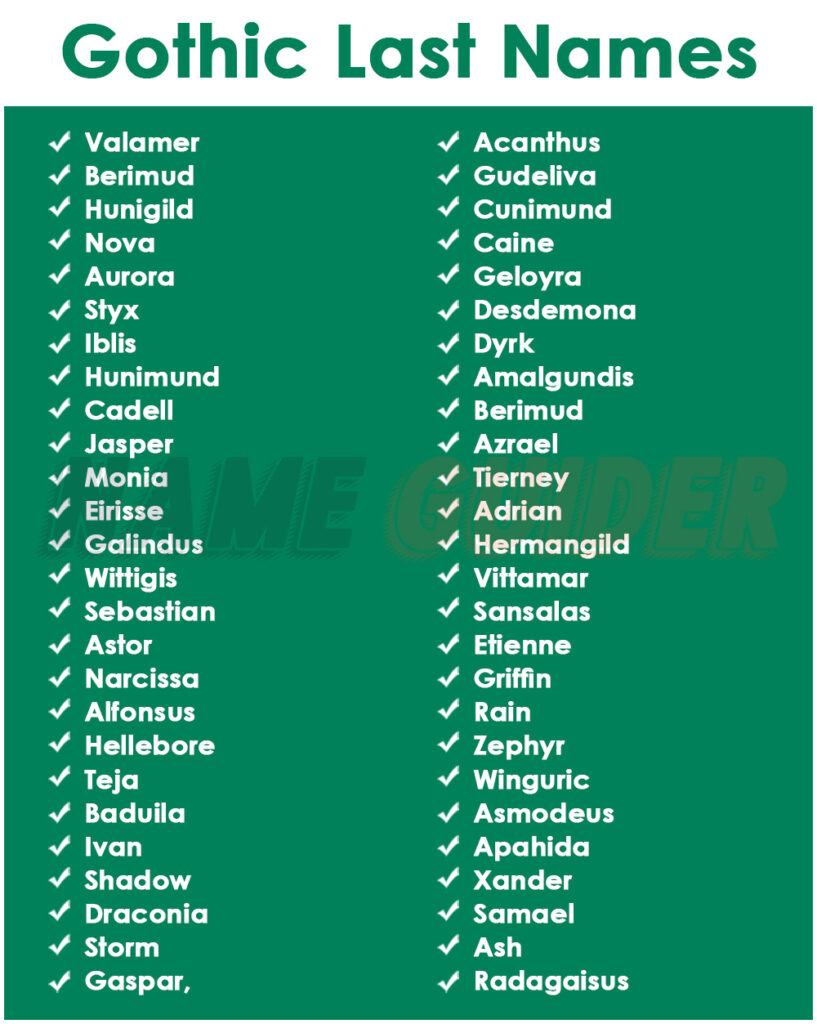Exploring The Allure Of Gothic Names: A Comprehensive Guide
Gothic names have long captivated the imagination of those drawn to the darker aspects of fiction, history, and culture. From the haunting beauty of literary characters to the enigmatic allure of historical figures, these names evoke a sense of mystery and intrigue. Whether you're searching for a unique name for your creative project or simply curious about the origins and meanings behind these names, this article will guide you through the fascinating world of gothic nomenclature.
The term "gothic" conjures images of medieval architecture, dark romanticism, and the supernatural. With roots in the Gothic subculture and influenced by literature, art, and music, gothic names often reflect themes of melancholy, beauty, and the macabre. In this comprehensive guide, we will delve into the meanings and origins of gothic names, their cultural significance, and how they can inspire creativity in various fields.
As we embark on this exploration, we will cover a range of gothic names from different cultures, their historical contexts, and notable figures associated with these names. By the end of this article, you will have a deeper understanding of gothic names and perhaps even find the perfect name that resonates with your artistic vision.
Table of Contents
- What are Gothic Names?
- The History of Gothic Names
- Popular Gothic Names
- Female Gothic Names
- Male Gothic Names
- Gothic Names in Literature
- Gothic Names in Pop Culture
- Choosing a Gothic Name
What are Gothic Names?
Gothic names are often characterized by their dark, mysterious, and sometimes archaic qualities. They may derive from various languages, including Latin, Germanic, and Old English, and frequently reflect themes of death, the supernatural, or nature.
Some key characteristics of gothic names include:
- Melancholic or dark meanings
- Unique spellings or phonetic structures
- Historical or literary significance
The History of Gothic Names
The origins of gothic names can be traced back to various cultural and historical contexts. The Gothic subculture emerged in the late 1970s and early 1980s, influenced by gothic rock music, literature, and art. As this subculture grew, so did the interest in names that embodied its aesthetic.
Throughout history, gothic names have also been associated with various literary movements, particularly the Gothic literature of the late 18th and early 19th centuries. Authors like Edgar Allan Poe and Mary Shelley created characters with names that evoke a sense of dread and fascination.
Popular Gothic Names
Here are some popular gothic names along with their meanings:
- Raven - Symbolizing mystery and intelligence.
- Draven - A modern take on the classic "raven."
- Isolde - A name of Welsh origin associated with tragic love.
- Lucian - Meaning "light," often associated with the duality of good and evil.
Female Gothic Names
Female gothic names often carry a sense of elegance and darkness. Here are some examples:
- Elvira - Meaning "truth," associated with the gothic horror genre.
- Ophelia - A name from Shakespeare's "Hamlet," often linked to tragedy.
- Morgana - A name associated with the mythical sorceress from Arthurian legend.
Male Gothic Names
Male gothic names can convey strength and depth. Here are a few notable examples:
- Dracula - The infamous vampire created by Bram Stoker.
- Vincent - Often associated with Vincent van Gogh, whose life was marked by struggle.
- Sebastian - A name with a classic yet dark appeal.
Gothic Names in Literature
Gothic literature is rich with names that enhance the eerie atmosphere of the stories. Names like "Heathcliff" from Emily Brontë's "Wuthering Heights" and "Dorian" from Oscar Wilde's "The Picture of Dorian Gray" are perfect examples of how names can embody the themes of decay, morality, and the supernatural.
Gothic Names in Pop Culture
In modern pop culture, gothic names continue to fascinate audiences. Characters in films, television series, and video games often bear names that evoke a sense of darkness and mystery. For instance, the character "Wednesday Addams" from "The Addams Family" is a beloved representation of gothic culture.
Choosing a Gothic Name
When selecting a gothic name, consider the following tips:
- Think about the meaning and origin of the name.
- Consider how the name sounds and its unique qualities.
- Reflect on the cultural significance and historical context.
Ultimately, the perfect gothic name should resonate with your personal aesthetic and creative vision.
Conclusion
In this exploration of gothic names, we have uncovered their meanings, origins, and cultural significance. From the haunting beauty of literary characters to the allure of historical figures, gothic names offer a wealth of inspiration for anyone seeking a unique name that embodies mystery and darkness.
We encourage you to explore the names mentioned in this article further. Perhaps you’ll find the perfect gothic name for your next project or even for personal use. Don't hesitate to share your thoughts in the comments below and let us know your favorite gothic names!
Penutup
Thank you for joining us on this journey into the world of gothic names. We hope you found this article informative and inspiring. Be sure to visit our site again for more engaging content on names, culture, and creativity!
All About Alison Angel: Biography, Career, And Impact
Exploring The Actors In Thor: Ragnarok
Hilarious Words Of Encouragement: A Lighthearted Guide To Boosting Your Spirits


